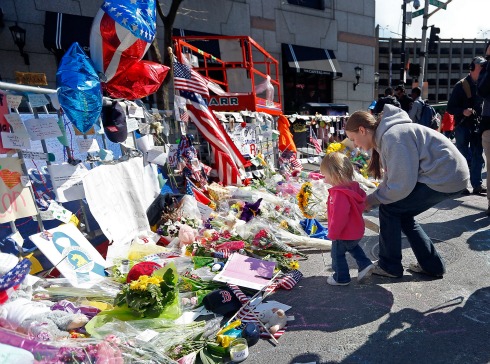Archives
AND MORE...

Encyclopedic Ignorance
_____________________

Offending Whose Sensibilities?
_____________________

BRAVO To The NYPD
_____________________

Catch & Release
_____________________

Respect For Barbarians
_____________________
June 12, 2013
Pernicious Nonsense
On Sunday, passersby respectfully inspected the memorial site in Boston’s Copley Square for victims of the Marathon bombing. The memorial radiates pain, but also Boston pride, “plus a touchingly naïve yearning for peace.”
“But peace doesn’t just happen. It must be won and enforced,” writes Bob McManus, in his piece on terror and surveillance (below). We agree.
And we also agree with McManus' characterization of NYPD's anti-terrorism efforts.
“How much surveillance is too much, and how much is not enough?” asks McManus.
Well, to borrow from U.S. Supreme Court Justice Potter Stewart's words and sentiments: We won't attempt to define what or how much surveillance is unreasonable in time of war, but rest assured we’ll know it when we see it.
Our so-called leaders and legislators in Washington, DC would do well to follow the NYPD’s lead, and learn how smart and targeted intelligence/counter-terrorism efforts are carried out, without driving EVERYONE crazy.
New York Post | June 12, 2013
Terror & Surveillance
Of balance — and trust
By Bob McManus

Laying flowers at a memorial site in Copley Square on Boylston Street for the deadly Boston Marathon bombing. Photo By: Nancy Lane / Courtesy: bostonherald.com
Boston – Not much remains along Boston’s Boylston Street to recall that afternoon eight weeks ago, when bombs erupted and three people died – one an 8-year-old child.
One exception stands in Copley Square, a modest expanse just a few strides distant from where the Marathon bombs exploded: a makeshift – but obviously heartfelt – monument to America’s most recent victims of Islamist fanaticism.
On Sunday, high clouds dappled a brilliant pale-blue sky as passersby – mostly tourists, it seemed – respectfully inspected the memorial, stitched together from a handful of metal police sidewalk barriers and hung with hundreds of tightly packed running shoes, flags, shirts and hats, plus those hand-lettered notes of remembrance that were ubiquitous around Ground Zero for so long after 9/11.
The memorial radiates pain, appropriately enough, but also Boston pride – plus a touchingly naïve yearning for peace, for more tranquil times when footraces were for running and sidelines were for cheering and nobody had to worry about holy warriors with pressure-cooker bombs.
But peace doesn’t just happen. It must be won and enforced – once upon a time an unambiguous undertaking, but since 9/11 no longer.
Today’s enemies don’t wear uniforms, an unremarkable observation except for what it implies: namely, that effective self-defense in these high-tech times necessarily brings fundamental American privacy principles into conflict with the need to protect against threats of a perhaps near-existential nature.
How much surveillance is too much, and how much is not enough?
Certainly, Edward Snowden’s revelations have re-energized a debate that had been on low boil; for better or for worse, it will proceed at its own pace.
For better, because such matters are always worth discussing.
For worse, because too many participants long ago decided that prospective anti-terrorism policing may be acceptable in principle, but never in practice – and many of them find the relatively benign efforts of the NYPD to be particularly offensive.
Some are slippery-slopeists – folks for whom surreptitious police work of any sort is the same as climbing into that handbasket to hell.
Others just hate the police. They resent authority, or they believe cops are stupid and venal and not to be trusted.
And still others object because Ray Kelly and his intelligence division – acting entirely within the law, and with specific approval from a federal judge – have been searching in the city’s Islamic community for Islamist threats.
Resentment of such attention is understandable, but is it reasonable? Where else are the cops to look?
Or should they not be looking in the first place?
Yet that track would essentially leave counterterrorism to the same national-security apparatus that – despite multiple warnings from the Russians – was caught flat-footed in Boston on Patriots’ Day.
A reasonable wariness of the power of the state is wise, even necessary. And none of the prejudices listed above are totally unreasonable.
But taken in their totality, they amount to pernicious nonsense – and a prescription for inactivity that most New Yorkers, steeped in 9/11, probably would find unacceptable if they fully understood the potential consequences.
As it is, the national debate over Snowden, the National Security Agency and related issues is occurring in the context of an equally urgent examination of egregious privacy abuses within the Internal Revenue Service, and a growing public awareness of just how intrusive the Obama administration’s health-care program is going to be.
The resulting blur, while understandable, is likely to be taken advantage of by people who don’t have America’s best interests at heart. And certainly not New York City’s.
Nor Boston’s, either.
Sunday afternoon, in Copley Square, film students were recording a birthday memorial video for Martin Richard of Dorchester, murdered with the others a couple of hundred yards away on Marathon Day.
He would have turned 9 on Monday, and it was a moving gesture. But that’s all in the past now – as is 9/11, and Fort Hood and so on.
But the war persists. Does America have the will to fight it?
Original article here.
Log In »
Notable Quotables
"Mr. Netanyahu is one of the most media-savvy politicians on the planet. On Friday he appeared live via video link on 'Real Time with Bill Maher,' taking the host’s alternately sardonic and serious line of questioning with gazelle-like alacrity."
~ Anthony Grant, jourrnalist who has written for many major newspapers and worked in television at Paris and Tel Aviv, interviewing former PM Benjamin Netanyahu on Monday, at the outset of Mr. Netanyahu's new book (more here).


